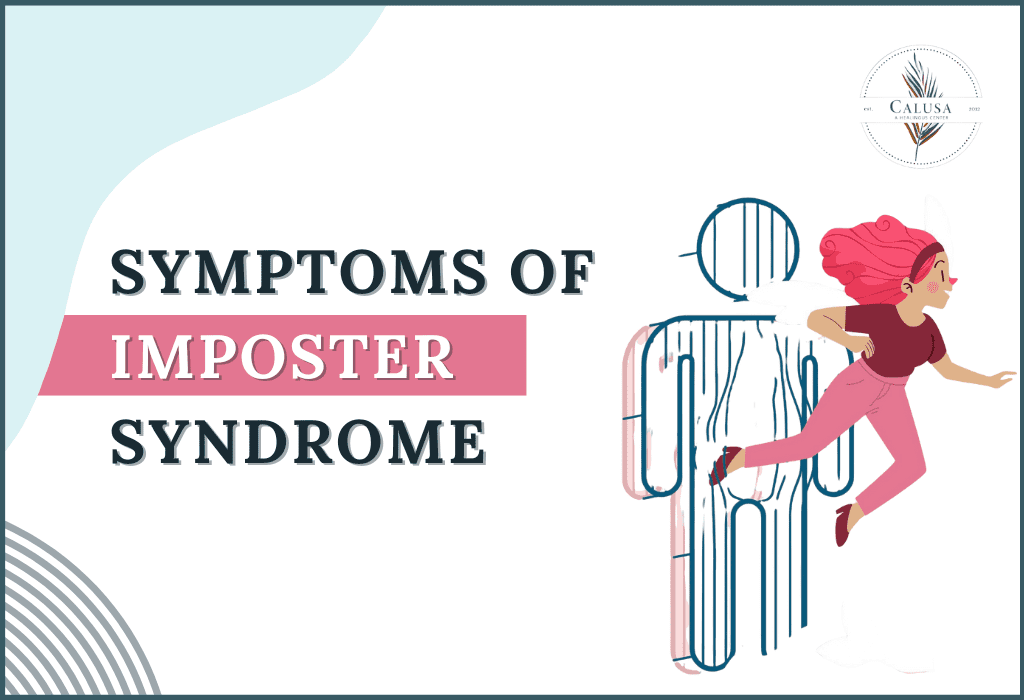Is imposter syndrome robbing you of the joy in your accomplishments?
With offered compassionate and effective treatment plans, potentially including medication and therapy like CBT, to help you overcome self-doubt and finally believe in yourself!
Have you ever gone through this feeling that you are not good enough, even when everyone around you praises your achievements? Maybe you lie awake at night, worried that one day, people will “find out” you are not as capable as they think. If this sounds familiar, you’re not alone. These feelings are common for those struggling with imposter syndrome symptoms, a condition that leaves you doubting your worth despite your successes.
At Calusa Recovery, we truly understand how exhausting this can be. The weight of self-doubt, the fear of being exposed as a “fraud,” and the constant pressure to prove yourself can take a toll on your emotional well-being.
With a decade of experience, we have helped individuals just like you rediscover their confidence and take back control of their lives. Our compassionate and personalized approach means we meet you where you are and work with you to overcome these challenges step by step.
In this article, we will go through recognizing the imposter syndrome symptoms that might be holding you back. More importantly, it’s here to remind you that healing is possible and support is within reach. So, let’s take this first step together.
What Is Imposter Syndrome?
Imposter syndrome is a deep-rooted belief that your achievements aren’t truly earned. You may feel like you have just been lucky or that you have somehow tricked others into thinking you are capable. People with imposter syndrome often live with a constant fear of being ‘exposed’ as frauds, even when there’s clear evidence of their success.
Imposter syndrome is prevalent among high achievers, with studies indicating that up to 82% of individuals experience these feelings at some point in their lives.
These feelings can affect anyone, whether you are a student, a professional, or someone balancing multiple roles. The good news is that imposter syndrome symptoms are not permanent; they are something you can overcome with the right support and tools.
10 Common Imposter Syndrome Symptoms
Identifying imposter syndrome symptoms is the first step toward managing. Here are the most common signs:
- Self-Doubt: Constantly doubting your ability and value, especially when other people compliment you.
- Perfectionism: Settling for perfection in all aspects of life and experiencing failure whenever you do not measure up to this.
- Fear of Failure: Don’t take on a difficult or risky project due to fear of failure.
- Downplaying Achievements: Thinking that your success has come as a result of luck, good timing, or assistance from someone else.
- Overworking: Even though the desire to show how hardworking and valuable you are by taking on more responsibilities and working overtime.
- Fear of Exposure: The ongoing fear of people finding out that you are not as competent as they presume you to be.
- Comparing Yourself to Others: Comparing yourself with others and ending up feeling like you are subpar in some way.
- Inability to Accept Compliments: Be hesitant when someone appreciates you and offers sincere congratulations.
- Procrastination: Procrastinating on tasks because you fear they will not turn out the way you want them to.
- Constant Anxiety: Suffering from constant fear and anxiety that asserts an individual is not suitable for a specific task.
Often, the symptoms accumulate on top of each other and one is unable to find a way out of it. But knowing them is the first step—it arms you with the knowledge to get assistance and begin the process.
How Imposter Syndrome Symptoms Affect Your Life
Suffering from imposter syndrome might feel like constantly pushing a small yet heavy boulder uphill. Imposter syndrome prevalence rates range considerably from 9 to 82%, depending on the screening method and threshold used. Rates are especially high among ethnic minority groups.
It doesn’t just affect how you feel about yourself—it impacts your entire life:
- At work, you are likely to turn down a new challenge since you cannot handle the risk of failure.
- In relationships, you may not be able to trust or communicate openly due to feeling unworthy of it.
- At an individual level, one might struggle with constant stress and anxiety, which are likely to leave one exhausted emotionally.
The longer one harbors such feelings, the more convoluted they may become, often making it difficult to solve them. But they don’t define you. With adequate encouragement, one is able to begin to acknowledge oneself in the same manner as one is perceived by others, as competent and worthy.
How to know that you have Imposter Syndrome Symptoms
The key to managing imposter syndrome is the ability to identify the condition in your life. Ask yourself:
- Am I lucky, and therefore, I am reaping what I have sown?
- Does it make me competitive and make me think that I am a loser and not measuring up to the mark?
- Is it fear that others will discover that I am not as capable as they have assessed me to be?
- Can I belittle the praise and the positive reactions I receive from other people?
If you answered ‘yes’ to these questions, you might be suffering from imposter syndrome. They should be received with kindness, of course, since we are all imperfect and making mistakes is part of being human. You are not defective in any way, and you do not require any kind of ‘repair.’ It’s normal to feel this way, and you just need help to manage through them.
According to the International Journal of Behavioral Science, imposter syndrome symptoms can lead to higher rates of anxiety and depression, with 40% of those affected reporting significant struggles with stress and mental health issues.
How to Eliminate The Feeling of Being a Fraud
It is essential to clearly understand that it is impossible to leave behind imposter syndrome symptoms without any effort, but it is possible if ….
- Acknowledge Your Feelings: Do not try to hide such feelings; rather, confront them. This is acceptable—that does not make you a WIMP!
- Challenge Negative Thoughts: Whenever you find yourself doubting your ability, ask yourself if there is any proof of that doubt. In most of the cases, there isn’t.
- Celebrate Your Wins: Always make time to introspect and acknowledge all successes, no matter the size. You earned them.
- Talk to Someone: Reveal your emotions to a third person, whether this person is a friend, a family member, or a specialist.
- Stop Comparing Yourself: No one’s life is perfect. Self-improvement as an individual is more important than comparing yourself to the next person and trying to be better.
Making these steps may appear awkward at first, but every single move brings more and more strength. Over time, negative self-talk disappears and is replaced by positive perceptions of the self.
Why You Don’t Have to Face This Alone
If you’re experiencing imposter syndrome symptoms, know that you don’t have to go through this alone. Here at Calusa Recovery, we have individualized treatments aimed for making you realize what you are going through and how you can overcome it.
It is essential to have a safe environment where all the emotions can be discussed, and a plan for regaining that confidence must be developed. We support you when you cannot support yourself and when you don’t think you are sufficient enough.
Healing takes courage, but you’ve already taken the first step by seeking information. Let us help you take the next step toward a brighter, more confident future.
Your Journey to a Brighter Tomorrow
Conclusion
Living with imposter syndrome symptoms can feel isolating, but it’s important to remember that you don’t have to face it alone. At Calusa Recovery, we understand how overwhelming self-doubt and fear can be, and we’re here to support you every step of the way.
You are not your doubts, and your worth is not up for debate. With the right care, tools, and encouragement, you can overcome these feelings and step into a life filled with confidence and self-assurance.
Let us help you find that strength within. Reach out to Calusa Recovery today to start your journey toward healing and self-empowerment. You’re capable, you’re worthy, and you don’t have to do this alone.
FAQs
Q: What does imposter syndrome feel like?
A: Imposter syndrome feels like persistent self-doubt, fear of being exposed as a fraud, and the inability to internalize achievements. Despite external success, individuals struggle with believing they’re deserving or capable, leading to anxiety and stress.
Q: What are the 4 P’s of imposter syndrome?
A: The 4 P’s of imposter syndrome are perfectionism, paralysis, procrastination, and people-pleasing. These behaviors often stem from self-doubt, pushing individuals to overwork, avoid challenges, or seek validation, which reinforces the cycle of imposter syndrome.
Q: What are the five types of imposter syndrome?
A: The five types of imposter syndrome include the Perfectionist, the Superhero, the Natural Genius, the Soloist, and the Expert. Each type reflects unique behaviors, such as overworking, avoiding help, or setting unattainable standards for oneself.
Q: What is the syndrome where you don’t believe in yourself?
A: The syndrome where you don’t believe in yourself is imposter syndrome. It causes individuals to question their abilities and feel undeserving of success, leading to constant self-doubt and fear of being exposed as a fraud.










